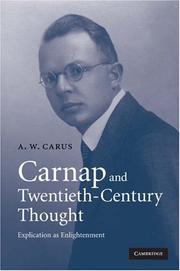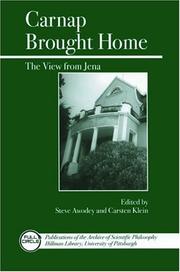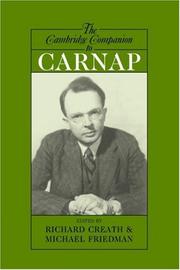| Listing 1 - 10 of 23 | << page >> |
Sort by
|
Book
Year: 1957 Publisher: Wien: Springer,
Abstract | Keywords | Export | Availability | Bookmark
 Loading...
Loading...Choose an application
- Reference Manager
- EndNote
- RefWorks (Direct export to RefWorks)
Book
Year: 1963 Publisher: La Salle : London : Open Court Cambridge University Press,
Abstract | Keywords | Export | Availability | Bookmark
 Loading...
Loading...Choose an application
- Reference Manager
- EndNote
- RefWorks (Direct export to RefWorks)
Multi
ISSN: 16242459 ISBN: 9782711629862 2711629864 Year: 2021 Publisher: Paris : Vrin,
Abstract | Keywords | Export | Availability | Bookmark
 Loading...
Loading...Choose an application
- Reference Manager
- EndNote
- RefWorks (Direct export to RefWorks)
On connaît généralement Carnap pour ses travaux au sein du Cercle de Vienne, pour son influence sur la philosophie américaine de la seconde moitié du XXe siècle ou pour ses thèses empiristes radicales, vérificationnistes et réductionnistes.C’est un autre Carnap qui est présenté ici : le philosophe allemand des années 1920 – de sa thèse de doctorat sur l’espace à la Construction logique du monde – déjà à la recherche d’une manière satisfaisante de combiner un empirisme radical avec la confiance dans le pouvoir de la logique de clarifier la constitution du monde, mais encore profondément marqué par le kantisme, le néokantisme voire la phénoménologie.Derrière l’éclectisme affiché par Carnap dans ses premières œuvres, derrière sa volonté de concilier les différents points de vue philosophiques et scientifiques sur le monde et d’éliminer ainsi les pseudo-problèmes métaphysiques, ce livre tente de saisir une reformulation originale de la question transcendantale des conditions de possibilité de la connaissance et de l’expérience d’objets.
Transcendentalism --- Philosophy --- Carnap, Rudolf, --- Transcendentalism - Philosophy --- Carnap, Rudolf, - 1891-1970

ISBN: 9780521862271 0521862272 9780511487132 9780521130868 9780511457173 0511457170 1107177995 1281944505 9786611944506 0511455879 0511487134 0511454066 0511453159 0511455100 0521130867 Year: 2007 Publisher: Cambridge Cambridge University Press
Abstract | Keywords | Export | Availability | Bookmark
 Loading...
Loading...Choose an application
- Reference Manager
- EndNote
- RefWorks (Direct export to RefWorks)
Rudolf Carnap (1891-1970) is widely regarded as one of the most important philosophers of the twentieth century. Born in Germany and later a US citizen, he was a founder of the philosophical movement known as Logical Empiricism. He was strongly influenced by a number of different philosophical traditions (including the legacies of both Kant and Husserl), and also by the German Youth Movement, the First World War (in which he was wounded and decorated), and radical socialism. This book places his central ideas in a broad cultural, political and intellectual context, showing how he synthesised many different currents of thought to achieve a philosophical perspective that remains strikingly relevant in the twenty-first century. Its rich account of a philosopher's response to his times will appeal to all who are interested in the development of philosophy in the twentieth century.
Philosophy, Modern --- Carnap, Rudolf, --- Influence. --- Carnap, Rudolph --- Karnap, Rudolʹf --- Карнап, Рудольф --- Carnap, Rudolf --- Philosophie --- Influence --- Arts and Humanities --- Philosophy --- Philosophy, Modern - 20th century. --- Carnap, Rudolf, - 1891-1970. --- Carnap, Rudolf, - 1891-1970 - Influence. --- Carnap, Rudolf, - 1891-1970

ISBN: 0812695518 081269550X 9780812695502 9780812695519 Year: 2004 Volume: 2 Publisher: Chicago (Ill.): Open Court
Abstract | Keywords | Export | Availability | Bookmark
 Loading...
Loading...Choose an application
- Reference Manager
- EndNote
- RefWorks (Direct export to RefWorks)
Carnap, Rudolf, --- Carnap, Rudolph --- Karnap, Rudolʹf --- Карнап, Рудольф --- Carnap, Rudolf --- Carnap, Rudolf, - 1891-1970.
Book
ISBN: 9780199661985 0199661987 Year: 2016 Publisher: Oxford : Oxford University Press,
Abstract | Keywords | Export | Availability | Bookmark
 Loading...
Loading...Choose an application
- Reference Manager
- EndNote
- RefWorks (Direct export to RefWorks)
Analytic philosophy is once again in a methodological frame of mind. Nowhere is this more evident than in metaphysics, whose practitioners and historians are actively reflecting on the nature of ontological questions, the status of their answers, and the relevance of contributions both from other areas within philosophy (e.g., philosophical logic, semantics) and beyond (notably, the natural sciences). Such reflections are hardly new: the debate between Willard van Orman Quine and Rudolf Carnap about how to understand and resolve ontological questions is widely seen as a turning point in twentieth-century analytic philosophy. And indeed, this volume is occasioned by the fact that the deflationary approach to metaphysics advocated by Carnap in that debate is once again attracting considerable interest and support. Containing eleven original essays by many of today's leading voices in metametaphysics, Ontology After Carnap aims both to deepen our understanding of Carnap's contributions to metaontology and to explore how this legacy might be mined for insights into the contemporary debate. This collection will be of interest to scholars and students working in metaphysics, semantics, philosophical logic, metaphilosophy, and the history of analytic philosophy.
Ontology --- Ontologie --- Carnap, Rudolf, --- Metaphysics --- Carnap, Rudolf --- Ontologie. --- Carnap, Rudolf, - 1891-1970

ISBN: 9780521549455 9780521840156 0521549450 0521840155 9781139001649 Year: 2007 Volume: *7 Publisher: Cambridge Cambridge University Press
Abstract | Keywords | Export | Availability | Bookmark
 Loading...
Loading...Choose an application
- Reference Manager
- EndNote
- RefWorks (Direct export to RefWorks)
Carnap, Rudolf --- Vienna circle. --- Cercle de Vienne --- Carnap, Rudolf, --- Vienna circle --- Viennese circle --- Wiener Kreis --- Philosophers --- Logical positivism --- Carnap, Rudolph --- Karnap, Rudolʹf --- Карнап, Рудольф --- Carnap, Rudolf, - 1891-1970. --- Carnap, rudolf (1891-1970) --- Cercle de vienne
Book
ISBN: 8483000695 9788483000694 Year: 1996 Volume: 3 Publisher: Barcelona : C.E.L.C./Ediciones del Bronce,
Abstract | Keywords | Export | Availability | Bookmark
 Loading...
Loading...Choose an application
- Reference Manager
- EndNote
- RefWorks (Direct export to RefWorks)
Science --- Sciences --- Philosophy --- Philosophie --- Carnap, Rudolf, --- Neurath, Otto, --- Wittgenstein, Ludwig, --- Quine, W. V. --- Philosophy. --- Science - Philosophy. --- Carnap, Rudolf, - 1891-1970.
Book
ISBN: 9782711683475 9782890079441 2711683478 2890079449 Year: 2002 Volume: 14 Publisher: Montréal : Paris : Bellarmin Vrin,
Abstract | Keywords | Export | Availability | Bookmark
 Loading...
Loading...Choose an application
- Reference Manager
- EndNote
- RefWorks (Direct export to RefWorks)
Philosophy and science. --- Logical positivism. --- Philosophie et sciences --- Positivisme logique --- Carnap, Rudolf, --- Carnap, Rudolf --- Congresses --- Logical positivism --- Carnap, Rudolf (1891-1970) --- Critique et interprétation
Book
ISBN: 2747544362 9782747544368 Year: 2003 Publisher: Paris : l'Harmattan,
Abstract | Keywords | Export | Availability | Bookmark
 Loading...
Loading...Choose an application
- Reference Manager
- EndNote
- RefWorks (Direct export to RefWorks)
La pensée de Carnap conçoit la connaissance comme une construction qui part non pas des intuitions a priori mais de symboles entendus comme substituts du vécu, projetés dans l'espace. Dans cet ouvrage, l'auteur étudie l'ensemble de l'oeuvre logique et épistémologique de Carnap et y décèle l'influence d'une philosophie, le symbolique, qu'il oppose à la philosophie transcendantale. S'il faut chercher des influences, c'est du côté de Wittgenstein, Russel et surtout, au début, de Mach qu'il faut s'arrêter et non au kantisme et au néokantisme.
Philosophy, German --- Logic --- Knowledge, Theory of --- Symbolism --- Philosophie allemande --- Logique --- Théorie de la connaissance --- Symbolisme --- Philosophy --- Philosophie --- Carnap, Rudolf, --- Logical positivism. --- Logic, symbolic and mathematical. --- Théorie de la connaissance --- Carnap, Rudolf, - 1891-1970. --- Carnap, Rudolf (1891-1970) --- Logique symbolique et mathématique --- Critique et interprétation --- Philosophy.
| Listing 1 - 10 of 23 | << page >> |
Sort by
|

 Search
Search Feedback
Feedback About UniCat
About UniCat  Help
Help News
News